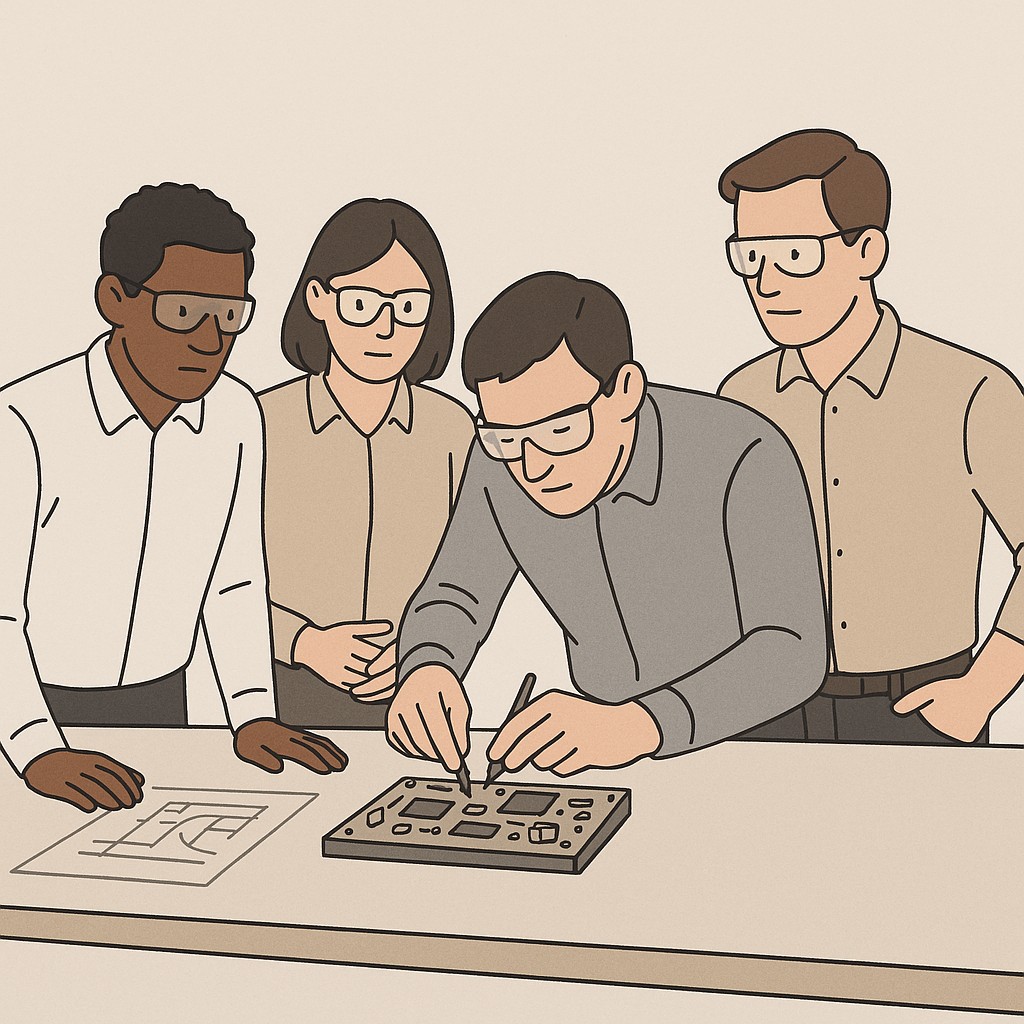How to Break Down Complex Problems into Steady Wins
How to Break Down Complex Problems into Steady Wins

Why Small Wins Compound Into Breakthroughs
Last week, Google managed something most quantum engineers dream about. They pushed the distance-7 logical qubit lifetime to 291 μs, outlasting the underlying physical qubits by more than double. This isn’t just a technical win—it’s a lesson in how error correction compounds when you keep at it. If you care about progress, that’s one of those moments you have to pause and really take in.
Reading through the details, something just landed for me. Nobody was obsessed with “the breakthrough.” No one held off until they saw the entire solution. Everyone on that team chose to break down complex problems, tackling one at a time—solve, test, improve, repeat. They burned through effort on the daily steps, not just waiting for a dramatic finish.

Here’s the thing: this pattern doesn’t belong only to quantum hardware. It’s how systems get built everywhere. One error fixed, one method sharpened, one result confirmed, again and again. It looks boring. It feels repetitive. I wish it didn’t sometimes, but that’s actually the secret: that boring, repetitive work is the engine.
You see it in software, in machine learning, in new products. Each time you repeat deliberate practice, it’s training the “learning to learn” muscle. Turns out action gamers aren’t just faster—they’re better at navigating new problems entirely (ScienceDirect). I’m guilty of chasing the “big reveal” moment myself. I used to imagine the final epic commit that solved everything. After a few years (and more stubborn bugs than I want to count), I caught myself scanning for the steady gains instead. Breakthroughs aren’t about dramatic jumps. They’re about intentional, repeated progress. Every time you shrink ambiguity, momentum builds—and eventually, the knottiest issues stop feeling so impossible.
So here’s my take: you can start a simple loop—literally this week—to turn all that uncertainty into real progress. Here’s how I run it.
Why Ambiguous Goals Paralyze Us—and Why Small Steps Fix It
You know the feeling. You finally block time to tackle ambiguous projects, and all of a sudden your mind goes blank. The end result is foggy, the requirements start wobbling around, and every choice suddenly feels loaded—one wrong move and it all caves. At one point, I spent four hours looking at a blank design doc, convinced I needed the whole architecture in my head before I could ship anything. The longer I stared, the heavier the project felt.
Funny aside. I once tried to organize my home workspace while juggling a gnarly backend spec. Thought I could “optimize systems” by building a shelf as precise as my code. Turns out I bought the wrong size brackets and drilled through a cable (twice). The shelf still leans; my code still works. But the messy lesson didn’t quite fit into a neat workflow. Sometimes small steps actually mean patching your cable before you architect the rest.
Back to the point: small steps change systems faster than chasing a mythical leap. Teams make real progress when they slice work into actual builds (Wageningen). Every tiny, shipped solution teaches you something you couldn’t predict—and kicks off the feedback loop early, so mistakes get absorbed and you’re not thrown off course. Six months ago, I thought “leaping ahead” was efficient, but only after a trail of scrambled releases did I start to appreciate how much momentum comes from stacking simple wins. Big systems aren’t built all at once. Each version is a bet you get to adjust, then build on. Deadlines get less terrifying because uncertainty starts to feel like something you’re chasing down, instead of dodging.
So don’t treat those big goals as some giant demand for all-or-nothing genius. Break down complex problems into a bunch of answerable questions. Each one small, each one building to the next.
Once you see it this way, the whole mountain turns into a staircase of experiments. Here’s how I run that loop for real.
The Loop: Break Down Complex Problems Into Predictable Progress
Step one never really changes. Decompose complex problems by narrowing the scope until you hit one crisp subproblem—the kind that unlocks something useful. Forget chasing the full map and ask, “What’s the bit that, if solved, would actually move us forward?” Even something tiny, like picking between pagination or filtering for an API, can be enough to wedge open the next answer. There’s no point hunting for mysteries—just get the next clean chunk.
Design the absolute smallest thing you can ship this week. Honestly, sometimes it’s barely more than a test stub or a hacky script. I fight the urge to round off every edge and “future-proof” the code. But every time I remember I’m testing a theory, not building a monument, I move faster—ship something, learn quickly.
When you ship, make sure every experiment gives you something you can use. Add the simplest instrumentation—logs, basic usage tracking, anything that will call out the weird edge cases. The unexpected results always tell the best stories. Once I tweaked a search index with a five-line fix, and queries sped up noticeably. No one guessed the outcome beforehand. Circle back to the quantum folks for a second. Incremental problem solving meant each error correction pass pumped new data into the next round, stacking the gains. Progress feels like that—messy, a little iterative, but it builds in a way you can’t fake. What you learn about timing, failure points, random spikes—it all ends up guiding the next sprint or commit.
Use what you find to pick the next subproblem—no need to leap wildly ahead. Let what just shipped update your map, and ask yourself, “What’s the next question that actually matters?” Don’t treat ambiguity like a hole—think of it like a menu. Every tiny win generates new options.
Here’s proof from my own work. When building our platform, we had no clue what the whole solution would look like. All we had was a stack of shifting requirements and nothing that resembled a big picture.
So we attacked one issue. Then another. Week by week, the thing started to take shape. Looking back at it now, there was no moment of sudden clarity. The big picture only showed up after we piled up enough working chunks for it to emerge. That’s the loop. I sometimes wish I could see the finished solution first, but the jumble feels normal now.
Break ambiguity into tasks, solve, ship, learn, repeat. That’s the path from frozen to shipping—and it’s where breakthroughs actually show up.
Making Incremental Progress Defensible—And Easy to Show
Let’s hit the first objection squarely. “Isn’t this slower?” I get it. Honestly, I questioned this for ages. Shipping piecemeal always looked slow when I was desperate to move the needle. Reality check: small tests reduce technical uncertainty because you catch errors quicker. The whole build isn’t riding on one wild guess. When work breaks into bite-size chunks, every one fires off feedback immediately. So if you take a wrong turn, it’s obvious and low-cost. You get time-to-learning, not just time-to-ship. I still feel awkward about tight framing, especially when the urge to build it all at once creeps in. It’s the only reason I’ve dodged major rework, though—and made deadlines work in crunch time.
Here’s the next worry I hear: “Small wins look unimpressive.” Honestly, the small wins strategy can feel that way at first. But if you show how they stack, it’s clear those small steps are actually footing for bigger ones. I talk about compounding wins—frame each ship as the setup for what the team does next. It’s only after the ripple hits that the total payoff is obvious.
Then there’s the “vision” problem: “What if we lose sight of the big picture?” Good question. I keep a single North Star at the top of every design doc. Regular check-ins—usually every week—keep us pointed where we mean to go or flag when we drift. That callback pulls things back on course, even when the weeds get dense.
What works to keep incremental progress legible: set up a weekly checkpoint, keep a public log of “shipped experiments” plus a list showing tradeoffs, and track real product movement, not just lines of code. Let people see the cadence—“This shipped; here’s the learning; next up”—so your momentum is visible. When you show small wins clearly, it’s hard for anyone to ignore their value.
And yes, even now, I still sometimes struggle with feeling the pace is too slow, or that a string of bugfixes won’t add up to a dramatic payoff. I don’t have an answer for making it thrilling every time. But the wins build—quietly at first—and suddenly there’s a platform where there wasn’t one before.
Ship a Win This Week—Your Progress Loop
Remember Google’s qubit breakthrough? The kind nobody saw coming from day one, because all those daily cycles stacked up until something new emerged. It’s easy to miss, but the big leap comes out of a ton of small, steady steps.
Ship a small win this week: turn rough notes into clear, AI-powered posts in minutes, with prompts tuned to your goals, constraints, and tone, so you can publish, learn, and iterate faster.
This week, give it a shot: (1) Name your overwhelming goal. (2) List three concrete subproblems and pick the one most likely to teach you something. (3) Scope the simplest, testable fix—get it working once, skip the polish. (4) Ship it by Friday, even if it’s rough. (5) Write out exactly what you learned and let that guide your next choice. By Sunday night you’ll have a shipped experiment and a new start for next week. It’s not just theory—it’s an actual loop you can run every sprint.
Don’t let size or fuzziness stop you. Your move: pick one overwhelming goal and break it into steps. Take the first one. Progress—little by little, then all at once—starts now.
Enjoyed this post? For more insights on engineering leadership, mindful productivity, and navigating the modern workday, follow me on LinkedIn to stay inspired and join the conversation.
You can also view and comment on the original post here .
